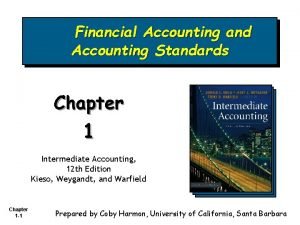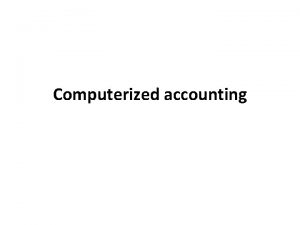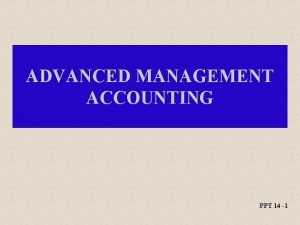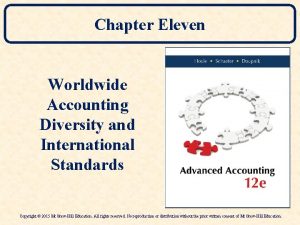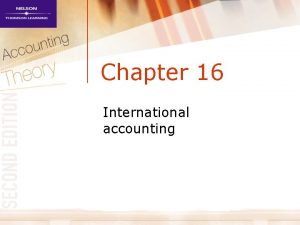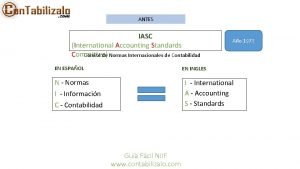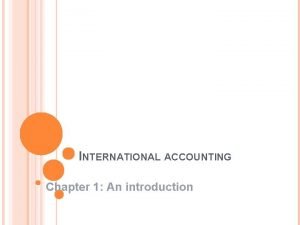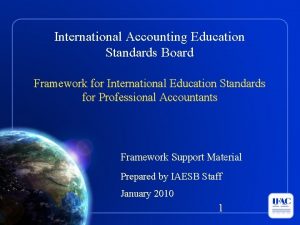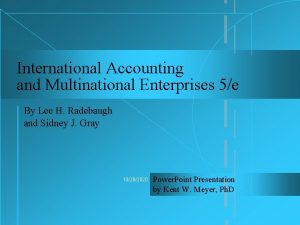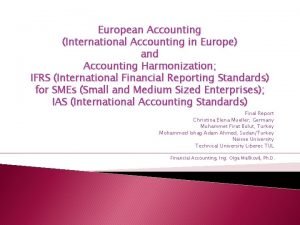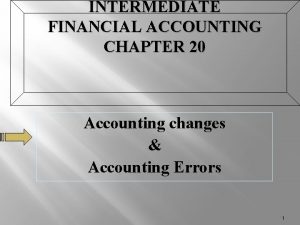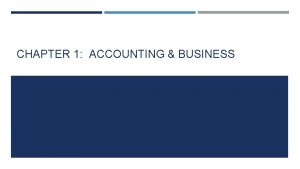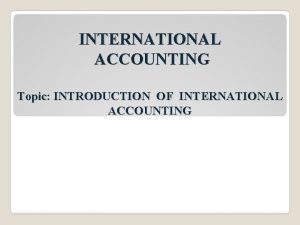Chapter 15 International Accounting International accounting z International













- Slides: 13

Chapter 15 International Accounting

International accounting z International context of accounting now a central feature z Various catalysts: yglobalization yinternational trade/MNEs/financial markets ytechnology z IASB and FASB now envisaging possibility of a single global accounting regime yharmonization/convergence Chapter 15 © Philip O’Regan 2016 2

Accounting blocs z For historical, commercial, social and cultural reasons accounting practice varies z However, possible to identify 4 blocs: y. Anglo-American y. Continental European y. Islamic y. Marxist z Significant variations between, within these Chapter 15 © Philip O’Regan 2016 3

European accounting z Common origin in Italian double-entry z Governance cultures: yless emphasis on stock market ysmall family-based businesses predominate yless developed accounting profession ylegalistic accounting perspective z Result is that financial reporting function less developed than Anglo-American model Chapter 15 © Philip O’Regan 2016 4

Germany z Dominance of prudence and conservatism principles as a result of economic history z Subordination of accounting to tax law z Result is legalistic, conservative accounting system z Relative unimportance of stock market and accounting profession Chapter 15 © Philip O’Regan 2016 5

Germany ctd. z B/S constructed on conservative value basis yaimed at government and creditors ynot primarily for decision-making purposes z Handelsbilanz: commercial balance sheet ydesigned to calculate profits figure that can be distributed, without compromising creditors z Steuerbilanz: tax balance sheet yunder Massgeblichkeits principle, tax accounts based primarily on Handelsbilanz z IFRS represents major catalyst Chapter 15 © Philip O’Regan 2016 6

German corporate governance z Traditionally firms seek funds from banks, not stock market z Therefore, ownership structure much tighter yfewer owners ysupervisory board with representatives of most significant investors ycross-investment z Experience of larger entities, e. g. , Daimler-Benz, demonstrates limitations of this model Chapter 15 © Philip O’Regan 2016 7

Recent developments z Governance regime limiting German companies z EU and IFRS as catalysts z Structures beginning to change ybroader shareholder base ygrowth of Frankfurt Stock Exchange yapplication of IFRS z Growing importance of accounting profession z Cromme Code of Corporate Governance yretains supervisory board ymay impact Anglo-American Model z Impact of events at Volkswagen? Chapter 15 © Philip O’Regan 2016 8

France z Shares some common historical experiences with Germany z e. g. , legacy of Italian double-entry method z Nevertheless, shows some significant accounting independence ycentral role of State in formulating practice ytightly regulated: Plan Comptable General ysubordination of accounting to legislation Chapter 15 © Philip O’Regan 2016 9

French corporate governance z As in Germany, a strong stock market culture does not exist z Ownership structure unique ystate ownership of many enterprises ymany small family-owned businesses ycross-ownership ystrong influence of banks z Impact of IFRS is considerable Chapter 15 © Philip O’Regan 2016 10

Recent developments z Corporate governance regime limiting French firms z EU/IFRS acting as catalysts z Changes beginning to emerge ystronger stock exchange – Paris Bourse ycompanies now reporting on internal controls ystate divesting from some larger entities yaccounting profession becoming proactive z Vienot/Bouton Reports ystrengthen role of independent directors/diversity z Updated governance code 2013 y“comply or explain” Chapter 15 © Philip O’Regan 2016 11

Harmonization & convergence z Greater awareness of international issues: ystronger financial markets/globalization/MNEs z Standardization: “uniform reporting rules” ytoo ambitious/inappropriate? z Harmonization: “reduction of reporting differences” yattainable goal? z Convergence y. FASB/IASB: equivalence road map y. SEC making concessions on US GAAP reconciliations y. Mixed results: leasing, revenue recognition Chapter 15 © Philip O’Regan 2016 12

Summary z Different accounting cultures exist z Anglo-American / Continental European ysignificant common origins yimportant differences y. Anglo-American seen as more mature y. EU anxious to retain European aspect z Convergence “project” results mixed Chapter 15 © Philip O’Regan 2016 13
 Financial accounting chapter 1
Financial accounting chapter 1 Introduction to accounting software
Introduction to accounting software Going concern assumption
Going concern assumption Social responsibility accounting ppt
Social responsibility accounting ppt Questions on accounting standards
Questions on accounting standards Worldwide accounting diversity
Worldwide accounting diversity Definition of international accounting
Definition of international accounting Contabilizalo
Contabilizalo International accounting standards ias
International accounting standards ias Introduction to international accounting
Introduction to international accounting International accounting and finance
International accounting and finance International accounting bodies
International accounting bodies International accounting education standards board
International accounting education standards board International accounting and multinational enterprises
International accounting and multinational enterprises
